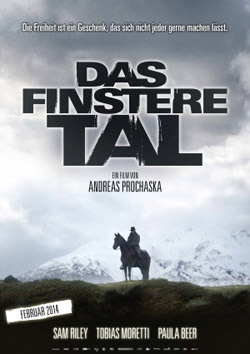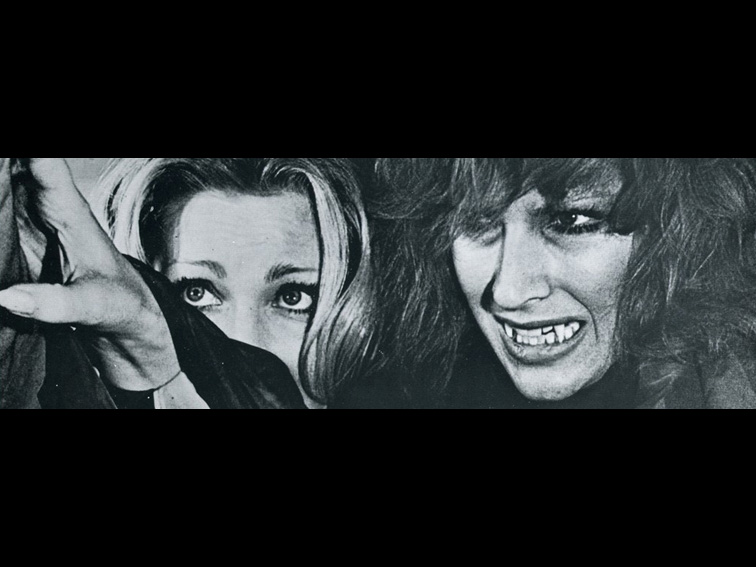Director: Andreas Prochaska
Writers: Martin Ambrosch, Andreas Prochaska, Thomas Willmann
Stars: Sam Riley, Tobias Moretti, Paula Beer
Andreas Prochaska’s The Dark Valley has picked up a grand total of twenty five awards and five additional nominations since its release in 2014, as well as being the Austrian entry for the Oscar that year. So why is it, you have to ask, that it didn’t receive any kind of cinematic release in the UK and was only slipped out onto video on the hush-hush two years later? Could it be, perchance, that the fact that it’s a western – an alpine western no less – has something to do with it? In other words, that it doesn’t fit within the rigid confines of what British critics and distributors deign that an ‘arthouse’ movie should be? Well, sod ’em, if they want to push some miserable Belgian tosh in which dysfunctional people moan at each other for ninety minutes or, even worse, Ken Loach’s latest attempt to outdo Woody Allen by making the exact same film two dozen times, then that’s their watch out. Because The Dark Valley is a fine film, a very fine film indeed.

Taking its cues from the likes of High Plains Drifter, The Great Silence and most particularly Keoma, the plot is set in a small German mountain village which is cut off for just about the whole of winter. Arriving just before the first snows is Greider (Sam Riley), an American photographer with some German heritage, who quickly crosses swords with head man Old Brenner and his six sons, who exert total control over the village. It seems they also have some rather old fashioned customs as well, not least the practice of primae noctis (whereby feudal lords have the right to sexual relations with – and in this case to impregnate – young women before they are married). But Greider might not be the mild mannered artist he superficially seems… and he might well have vengeance in his heart.
Director Andreas Prochaska has obviously watched his share of Spaghetti Westerns, and this is very much a reinvention of the genre with a modern twist. Violent, bloody and somber, it’s shot with a similarly imaginative use of framing and music (some of which works, some of which doesn’t). As with many Italian genre outings the narrative is a pared down melodrama about family and, more specifically, the corruption of family; it also shares an element of irony with them in that the hero ends up defending townsfolk who quite frankly don’t merit defending – they’re so passive and weak they just about deserve everything they get. Keoma – in which Franco Nero battled his cruel half-brothers – is the key influence here, but the film is less showy and more subdued, more ‘arty’ for want of a better word. It’s all beautiful to look at, well acted, and can be enjoyed purely as entertainment or as a kind of metaphorical allegory for the rise of fascism (if you’re so inclined). Along with Slow West and The Salvation it marks true revival in the European western, let’s hope there’s plenty more to come.
The WildEye Rating: 9/10


Spot on Matt. The film saw no local release here in Los Angeles either and I had to see it on DVD. Somber in tone is to put it mildly. There’s never a smile or grin or even a crack in the faces on anyone in the film. They don’t even smile when Greider leaves town at the end after freeing them of the tyrants who terrorized them for generations. Apparently from the look on their faces they don’t know how they are going to live as free men without someone ordering them around. There are a few errors in either the editing or the stupidity of the Brenner’s that they can’t locate our hero hiding out in a cabin in the woods. Obviously there should be plenty of foot prints to follow in the deep snow. I kept seeing in Riles as either Peter Lee Lawrence or more likely Lou Castel. A well made, but very dark and morose film.
You can’t help but watch this thinking ‘who would have played this character in the sixties?’ I thought of Peter Lee Lawrence as well, with the assorted brothers played by the likes of Bruno Corazzari, Stelio Candelli etc.